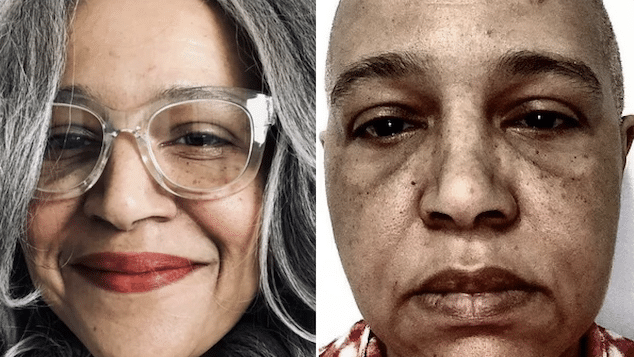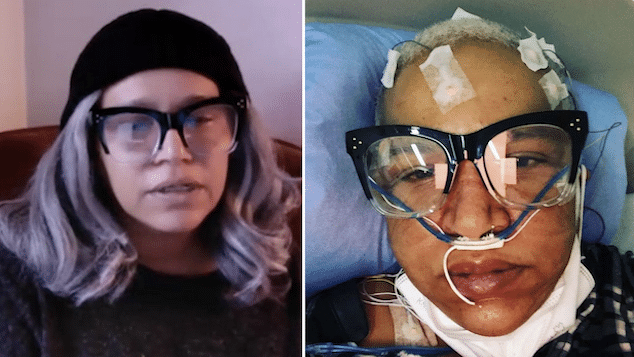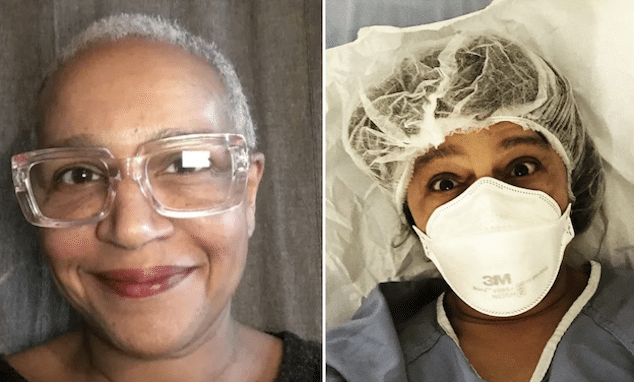
Tracey Thompson, Toronto, Canada woman with long COVID applies to be euthanised cause she’s broke as the assisted suicide program becomes a new viable solution to the horror of many as Canada’s healthcare system is held to scrutiny.
Have we finally arrived at a place where if one can’t afford medical care, then euthanasia (aka assisted suicide) is the next best and encouraged option?
A report has told of a Canadian woman applying to be euthanized after long Covid left her jobless and in constant pain and close to bankrupt as she now awaits to find out whether her application for assisted suicide has been granted.
Tracey Thompson, 55, from Toronto, has not been able to work since catching the virus in 2020 and is so sore and fatigued she stays in bed for up to 22 hours a day.
Assisted dying as the default remedy for low quality life?
The former chef has been robbed of the simple pleasures in life: she’s too weak to cook, too nauseous to eat and can’t listen to music, read or watch movies because her brain fog is so severe she ‘can’t process the info.’
In the nearly four years she’s been suffering with her illness, she hasn’t been able to work and has run out of her savings. She also has no family to speak of and has lost all her friends according to the dailymail.
Now, Ms Thompson is seeking to end her life through Canada’s assisted dying program, widely considered one of the most permissive in the world.
Thompson’s case has once again ignited debate whether assisted dying has now become the default remedy for a less than ideal functioning healthcare system along with how easy getting permission to end one’s life has now become in Canada.
‘My quality of life with this illness is almost nonexistent, it’s not a good life,’ she told the dailymail. ‘I don’t do anything. It is painfully boring. It’s profoundly isolating.’
In Canada, anyone with an incurable medical condition can apply to die, even if, like long Covid, the illness itself is not terminal.
Thompson contracted Covid-19 in March 2020 and, like millions of sufferers, developed a sore throat and lost her sense of taste and smell.
It wasn’t until months later, though, that her ordeal really began. Rather than get better like most do after a few weeks, her health slowly deteriorated.
Still struggling to think, breathe or exert any physical exercise in May that year, she went to the emergency department, where doctors ran tests.
‘At that time, they didn’t even know what long Covid was – no one did,’ Ms Thompson said.
When doctors couldn’t find anything definitive, they sent her home, leaving Ms Thompson feeling ‘dismissed,’ adding she felt it was ‘tough to be taken seriously’.

‘My life is painfully boring…’
In the fall she was back in the hospital after suffering chest pains and struggling to catch her breath for 36 hours. After months of tests and doctor and hospital visits, she was finally diagnosed with long Covid in 2021.
She was initially able to live off her savings, but her finances began to dwindle as she had no active income and had to pay for housing, food and medical treatments.
Now, with no job or energy to do much, Ms Thompson says each day is ‘painfully boring.’
With no quality of life solution in front of her, euthanasia for the long suffering woman increasingly has become a viable option.
Most days look the same she tells the dailymail: She wakes up, takes several medications, drinks a meal replacement shake and goes to the bathroom.
Mustering enough energy to get to the bathroom is the ‘biggest part of my day,’ she tells the tabloid.
From there it’s back to lying in bed and waiting until it’s time to eat. Once a professional chef who loved cooking and eating, Ms Thompson has become ‘allergic to everything’ and the foods she is able to eat are limited. She will cook unseasoned chicken and vegetables most days.
Qualifying for Canada’s Medical assistance in dying (MAID)
She then takes more medications, including a pill to go to sleep. ‘Then I wake up and I do the whole thing again.’
Ms Thompson has no family and said she’s lost most of her friends due to her illness. She also had to give her dog away because she could no longer care for her properly.
She sometimes attends virtual sessions of long Covid support groups and will scroll on Twitter to find people in similar situations because ‘there are people there.’
On a good day, Ms Thompson said, she can sometimes sit up in her chair on the computer for a little while and twice a month she walks around the block.
Explains: ‘My quality of life with this illness is almost nonexistent. There is a real absence of life. It’s not a good life.’
To qualify for MAiD, people must meet all criteria: be eligible for health services funded by the government; be at least 18 years old and deemed mentally competent; have an irremediable medical condition — one that is irreversible, in advanced stages and causes unbearable physical or mental suffering — make a voluntary request to die; and give informed consent to receive medical assistance to end your life.
There are two methods MAiD uses to end someone’s life. In the first, a doctor or nurse practitioner administers a drug that causes death. In the second, a doctor or nurse practitioner prescribes a drug to a patient that they take themselves.

Pandora’s box
Medications used in MAiD deaths are often drugs healthcare providers already use for other purposes, but in much lower doses, like pain control, anesthesia and nausea.
Since her initial Covid diagnosis, Ms Thompson has been diagnosed with myalgic encephalomyelitis, or chronic fatigue syndrome (ME/CFS), postural orthostatic tachycardia syndrome (PoTS) and mast cell activation syndrome (MCAS).
ME/CFS is a complicated disorder that many doctors remain skeptical of, given its ambiguous definition, difficulty to diagnose, unknown cause and resemblance to other disorders or side effects of other conditions. Some have even suggested the illness does not exist.
Patients with chronic fatigue syndrome are diagnosed after suffering from severe exhaustion that does not improve with rest for six months and sufferers say they are so tired they become housebound for days after carrying out even the simplest of tasks.
There is no cure for the condition.
Ms Thompson has also been diagnosed with POTS, a condition in which the heart rate increases very quickly after getting up from sitting or lying down. With POTS, the body cannot keep blood flowing at a healthy pace and cannot keep blood pressure steady and stable.
The condition can cause lightheadedness, dizziness, brain fog, fatigue and chest pain. The exact cause of POTS is not known, but people who have recently suffered a viral illness are at a higher risk of developing the syndrome.
Additionally, she has been diagnosed with MCAS, a condition in which a person experiences repeated instances of symptoms of anaphylaxis, a severe allergic reaction. Symptoms include hives, low blood pressure, swelling and difficulty breathing.
Severe anaphylaxis can be fatal.
While symptoms resemble an allergic reaction, MCAS is not caused by allergies, though treatment for allergies — like antihistamines and epinephrine can be helpful at treating the condition when symptoms appear.
There is also no cure for this disorder.
Long Covid is estimated to affect between nine and 20 million Americans, but it is notoriously difficult to diagnose as most clinical diagnostic tests appear normal and much was not known about it in the early days of the pandemic.
With Ms Thompson likely to be one of many new cases in the sphere of Canada’s assisted suicide, the program is likely to remain controversial as it continues to be more contentious as it has expanded to include more groups.
Canada recently came under fire for considering adding another subsect of the population for eligibility: terminally ill minors.
The change would allow those under the age of 18 to be euthanized, a procedure the current policy blocks.
For those seeking to assist Ms Thompson in meeting her medical costs and housting, they can go to her GoFundme account and make a donation.





